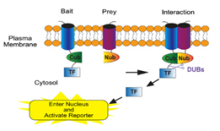BACKGROUND
Lung cancer is one of the most common and deadliest cancers worldwide, with an estimated 1.7 million new cases reported annually. Approximately 85% of cases are non-small cell lung cancer (NSCLC), of which 17-78% (depending on geographic region) contain activating mutations in the receptor tyrosine kinase (RTK) epidermal growth factor receptor (EGFR), with the majority of these mutations corresponding to in-frame deletions in exon19 (ex19del) or a leucine to arginine substitution at amino acid position 858 (L858R). Oncogenic addiction of tumors to these mutant receptors has led to the development and approval of several generations of successful tyrosine kinase inhibitor (TKI) therapeutics (which specifically target the kinase activity of oncogenic EGFR) for treatment of patients with metastatic NSLCLC. Unfortunately, patients undergoing treatment frequently acquire resistance to these drugs, often through the overexpression of other RTKs or additional mutations in EGFR. For instance, almost 50% of patients treated with the third generation TKI Osimertinib acquire an additional mutation (C797S) that mediates resistance to the drug, and there are currently no approved targeted therapeutic options for patients with this common form of NSCLC. Novel drugs for treatment of patients with mutant EGFR-mediated NSCLC are therefore urgently needed, including both new TKIs and compounds with novel modes of action less susceptible to the development of drug resistance.
TECHNOLOGY OVERVIEW
To help improve the discovery rate of novel therapeutics for the treatment of RTK-associated cancers Toronto researchers recently developed the Mammalian Membrane Two-Hybrid Drug Screening (MaMTH-DS) platform, a high-throughput, live-cell drug discovery tool to rapidly detect compounds that specifically target RTK mutants via diverse mechanisms (i.e. beyond traditional kinase inhibition). Using this approach to screen a drug-resistant, oncogenic, triple mutant form of EGFR (responsible for a major form of currently untreatable NSCLC) against a pilot compound collection the researchers successfully obtained novel composition of matter in the form of a small molecule that specifically targets this triple mutant via a completely novel mode of action. The researchers are working in collaborating with the Drug Discovery Group at Ontario Institute for Cancer Research (OICR) to perform follow-up validations and generate higher potency derivatives as they investigate the potential use of this compound as a new approach to the treatment of drug-resistant NSCLC.
COMPETITIVE ADVANTAGE
- Novel composition of matter for use in treatment of NSCLC
- Effective against NSCLC forms resistant to currently approved drugs
- Functions via a mechanism of action distinct from that of available tyrosine kinase inhibitor treatments
- Potentially less susceptible to the development of drug resistance
- MaMTH-DS assay offers high-throughput design, ease of use/implementation, low cost, direct live cell testing (allowing elimination of toxic compounds earlier in the screening pipeline) and the ability to detect targeted compounds functioning via a wide range of mechanisms (versus other platforms, such as in vitro kinase assays, which look strictly for specific activities such as kinase inhibition)
APPLICATIONS
This compound has the potential for use in the treatment of commonly occurring, drug-resistant forms of EGFR-mediated NSCLC for which there are currently no satisfactory targeted therapeutic options.
INTELLECTUAL PROPERTY STATUS
- Granted US Patent (Sept. 2021)
PROJECT STATUS
Target validation and mechanism of action studies are ongoing, along with med chem efforts on derivatives in various in vitro, in vivo and organoid models (in vitro and/or in vivo studies.





